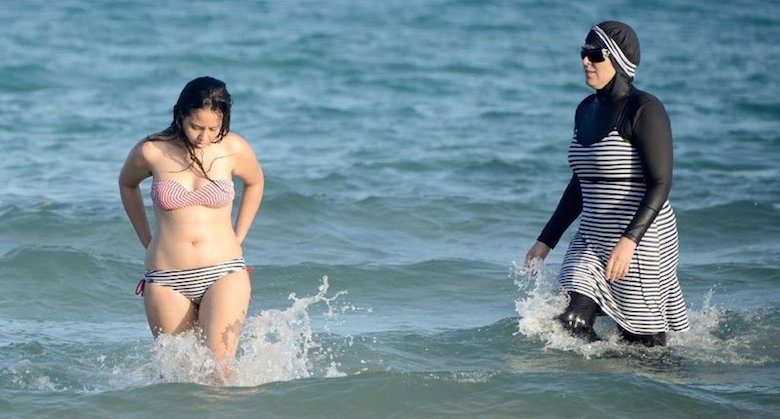Whenever I see people limit themselves in what they can wear or what they can eat or do because of their religious beliefs, it bothers me as a sign of the hold that religions have on people but I would not seek to prevent them from acting in that way. Hence the new French laws that bans women from wearing the ‘burkini’, a full-body swimsuit garment as seen in this photo that covers them up when they are at the beach, seems to me to be wrong.
Authorities in several French towns have implemented bans on the Burkini, which covers the body and head, citing concerns about religious clothing in the wake of recent terrorist killings in the country.
The images of police confronting the woman in Nice on Tuesday show at least four police officers standing over a woman who was resting on the shore at the town’s Promenade des Anglais, the scene of last month’s Bastille Day lorry attack.
After they arrive, she appears to remove a blue long-sleeved tunic, although one of the officers appears to take notes or issue an on-the-spot fine.
The photographs emerged as a mother of two also told on Tuesday how she had been fined on the beach in nearby Cannes wearing leggings, a tunic and a headscarf.
Her ticket, seen by French news agency AFP, read that she was not wearing “an outfit respecting good morals and secularism”.
Societies have long claimed the right to determine what people can wear and do in public and so drawing the line on what can and cannot be done is not easy. But in general, rules that are based on secular reasons and applied neutrally are more defensible than those that are based on religion or gender. So for example, we have had women in parts of the US successfully challenging laws that allow men to not wear clothes above the waist but do not allow women to do so.
It was not that long ago when women were criticized for wearing clothing that was too skimpy at the beach. Mark Frauenfelder provides us with a short history of this issue of what women can and cannot wear.
The French law appears to be religion-based and it is as problematic for the state to order women to be uncovered as it is for some Muslim-majority countries to order women to be more covered up than men. I assume that a Roman Catholic nun wearing her habit during a day at the beach will not be ordered to either disrobe or depart. I also assume that someone who was highly prone to skin cancer and thus covered up completely at the beach would not be ordered to remove their outer garments.



Obviously the secret to women’s lib is to have a bunch of crusty white men tell us what we can or can’t wear.
Isn’t it a bit like a rule banning clothes at a nudist colony? Have there been instances of nuns and orthodox jews trying to bathe and being stopped? It would be interesting to set up some test cases….
Ah. I see. So, the all-wise French authorities have dedicated themsleves to the task of banning clothing that is symbolic of the oppression of women, have they?
Laudable goal. I now confidently await their ban on high-heeled shoes.
.
.
.
[Not holding my breath on that one.]
aashiq, my understanding is that clothing is allowed in nudist colonies, but when one is the sole clothed person around it becomes awkward to stand out.
aashiq,
If the nudist colony is a private organization, I think that they have great freedom in setting up rules.
The ban is wrong, but holy shit is that burkini stupid.
Umm… wetsuit?
Full body swimsuits, including a “face-kini” were a big thing in China a couple of years ago.
Nowt wrong with a burkini, they are only a bit different from “stinger suits” worn by swimmers in known stinging jellyfish areas. My wife wears a device called a “tankini” because she’s not comfortable with people staring at her crotch. The right to ogle at acres of bare female flesh is what the French authorities are fighting for, the little perverts.
There was a short time a few (less than 10) years ago, when every high-performance, international-competitor, swimmer wore full-body swimsuits.
The suits were so hi-tech as to be the stuff of science fiction.
Then the InternationalCompetativeSwimming® Gods banned them.
…
Tri-athletes and other swimmers who spend a long time in the water still use them.
Thanks Mano and anat. I’ve recently been seeing pictures of nuns in the water at the beach, in full-dress habits. If this is permitted under the new law, then a ban on burkinis is clearly unfair. Singling our burkinis with the intention of targeting Muslims is wrong.
However, if all full-dress is banned in public beaches, then I think the situation becomes trickier. There are dress codes in various situations….for example, you can’t go naked to a restaurant, and some events specify coat and tie. It seems to me that the govt is within its rights to impose dress codes for all public beaches.
This doesn’t really have anything to do with clothing or religion. This is a brand; a good old-fashion sign of ownership of livestock. The state of France is sending a message about who owns these women.
@11, aashiq
But, as Mano states, “rules that are based on secular reasons and applied neutrally are more defensible than those that are based on religion or gender.” I would add to that rules that are quite arbitrary that don’t have good reasons at all. Governments shouldn’t be able to make arbitrary rules. So, even if it is a full-dress ban to try to make it look like it is not a religious law, people should still be able to push back against this if the government has not provided any good reason for the law.
I’d also caution against confusing the rules of private establishments with public areas. Many restaurants are going to be private and could understandably have dress codes as long as they aren’t discriminatory against particular groups of people* (which, in turn, must not be confused with issues of people’s comfort).
Also, I have heard there is a nude restaurant in London now. Yeah, sure, that’s not France, but the point is different private establishments could have different rules.
* I will note, though, as I believe Mano has in the past, it sadly seems generally acceptable to discriminate against the poor.
I think this is a case where the French are actively harming their objective. Wouldn’t you rather the Muslim women use the beach and wonder why they are the ones who have to wear that decidedly stupid burkini when other women are free to do what they want ? or would you rather they sit at home as will likely be the case if there is a ban.
At Gantry State Park near Brooklyn there is a playground with water fountains for kids to play in in the summer. A lifeguard stands duty when the water feature is operational. One of the many rules is that swim attire must be worn. I have seen young, uncomfortably hot Orthodox Jewish young girls wearing what amounted to full body cover (which they may have considered appropriate for swimming) denied the right to cool off in the fountains, though they had probably come to the park expressly for the purpose of playing in those fountains and were probably not close to home. Public pools in the area have the same problem. How can we chide the French when the same kinds of incidents happen here?
The Muslim women who wear burkini are apparently a small fraction of all, and those who go to the beach are smaller still. So this seems to be a cultural temper tantrum by France.
It would be great if some nuns would agree to set up a “test case” and go into the water, side-by side with some Muslim women. Would the cops strip them all?
@15
I worked at a public pool before and we had the same rules. It has to do with how much stuff you bring into the water and that normal clothes are more prone to do this, which would result in a much higher usage of chlorine. And since you can’t tell the difference if someone is coming in freshly laundered or a-week-old clothes, you just ban street clothes altogether. Three things need to be considered here though. 1. A burkini IS swim attire. The materials are suited and they aren’t worn in other settings. 2. The ocean is not something you have to chlorinate to keep it fit for public use. I don’t see them ban shorts or other street wear but specifically one item. 3. They ban them from being used at the beach. Most pools accept it if people (including the lifeguards) wear normal clothes, you just can’t enter the water.
Heidi,
I am surprised that those girls were denied the use of the water fountains. Are the fountains like sprinklers? If so, why do they need a lifeguard?
tardigrada,
That is useful information. Thanks!
In the Caribbean I usually wear a rash guard (a tightly-fitted T-shirt) when swimming, and always a rash guard and leg wear like tights when snorkeling. These are for sunburn protection and to avoid coral burns if I accidentally brush the animals (something I conscientiously avoid.) I strip down to a swim suit when I get out of the water.
Many other women wear rash guards, and one avid swimmer wears a full-body guard, a swim cap and goggles. Except for not having a skirt, she’s as covered up as the women in burkinis. No one has ever suggested that there is anything wrong with how we are dressed.
Whether the proscriptions against Islamic women showing their bodies were originally developed by men or not, the women themselves are choosing whether they go to the beach, and what they want to wear. Unless their clothing is so bulky that it creates a hazard of being pulled under and drowned, it is not for the French authorities (who appear to be-- all men!) to legislate their private tastes.
I also think that seeing Muslim women acting their natural selves, playing with their kids, enjoying the water, will help break down the ridiculous stereotypes of Muslim women as mindless docile slaves that have infected the media (as a certain candidate demonstrated in his attack on an American Gold Star mother.)
Logically I think the reason this is so stupid is because it appears to be about one thing but is in reality intended to serve a completely unrelated purpose. It’s supposedly about swimwear. But the real point has nothing whatsoever to do with that, it’s simply to tell people who are different that they are not welcome and will be excluded.
I’d like to point out that this isn’t the first time the French have pulled something this boneheadedly counterproductive. Does anyone else remember the school hijab ban?
inqusitiveraven,
‘Boneheaded’ is right. Wouldn’t you want traditional Muslim women to be out and about and mixing with other people and perhaps realizing on their own that wearing these outfits is uncomfortable and that a religion that demands it is peculiar to say the least? Or do you want them to retreat into their homes, shielded from secular influences and furious about being discriminated against?
http://www.cnn.com/2016/08/26/europe/burkini-ban-global-reaction/
Looks like what will the French do to fully clothed nuns on the beach was tested (also motorkinis)